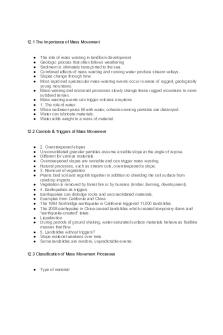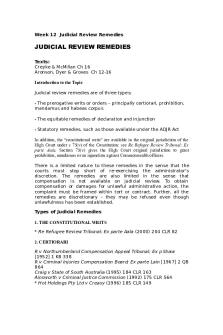The Value of Philosophy - Lecture notes 1-2 PDF

| Title | The Value of Philosophy - Lecture notes 1-2 |
|---|---|
| Course | Fundamental Philosophical Questions |
| Institution | University of Ottawa |
| Pages | 3 |
| File Size | 50.1 KB |
| File Type | |
| Total Downloads | 76 |
| Total Views | 115 |
Summary
Lecture notes on the value of philosophy according to Sir Bertrand Russell and John Dewey...
Description
The Value of Philosophy Sir Bertrand Russell ● Was a lecturer at Trinity College, but was dismissed in 1918 due to his pacifism, and later was sentenced to a six month prison because of his opposition to WWI ● Won the Nobel Peace Prize in 1950 ● Considered one of the most influential logicians of the century ● Prolific writer ● Identified two main sources of negative attitudes towards philosophy: ○ Influence of science (scietism) ■ Source of invention and technology ■ Does not accept the uncertain (indefinite) character of philosophical contemplation, and claims that it lacks any substantial meaning and does not contribute to truth ■ Provides positive, certain, and applicable knowledge ■ Has utility, is useful and affects us directly ○ Influence of practical affairs (pragmatism) ■ Does not appreciate philosophical procrastination, and the ineffectiveness of philosophical thinking ■ Values only practical things (material needs) ● Other sources of negative attitudes towards philosophy… ○ Philosophy as an overly abstract form of reflection ○ Generates endless questions, while yielding no definite answers ○ Perceived as a threat for the accepted life routine (religion + God) ○ Giant linguistic game ● Russell believed these attitudes were based upon misconceptions pertaining to: ○ The ends or purposes of human life ○ The goods that philosophy strive to achieve
●
●
The Ends of Life… ○ The practical man identifies the ultimate human goals with materialistic acquisitions and does not recognize the necessity of providing food for the mind. Obsessed with sensual pleasure and desire ○ The scientist aims at knowledge, but its scope is limited to understanding the physical world. Identifies human goals with knowing how things work ○ Philosophy aims at knowledge but is the kind of knowledge that gives unity and system to the body of sciences ○ The philosopher believes there is more to life than simply matter and utility (power/wealth) The Goal of Philosophy… ○ For the practical man there is no goal in philosophy and believes it is a mind game
○
● ● ● ● ●
●
● ● ● ●
For the scientist there is no goal in philosophy and believes it produces false, arbitrary and ineffective speculation ○ For the philosopher the goal is to produce food for the mind and cultivate thought by fighting prejudice, pre-conceptions and dogmatisms Philosophy satisfies intellectual and spiritual needs It achieves its value indirectly, through its effect upon the lives of those who study it The very value of philosophy lies in its uncertain character The world without philosophy becomes definite, finite, obvious, and new ideas + possibilities get rejected Chief Values of Philosophy ○ The Uncertain Character of Philosophy ○ Enlarges our Thoughts and our World ○ The Impartiality of Philosophy Enlarges our thoughts ○ Boundaries of the self ○ Contemplating the infinity of the universe ○ Creating union between the self and the world Philosophy frees us from the tyranny of custom, prejudice, and dogmatism It liberates us from our narrow and personal aims and concerns that are rooted in our pure instinctive private interests Philosophy does not divide the universe into us and them, but views us all impartially and as citizens of the world The mind becomes united with the universe, that is, its highest god
John Dewey ● Called the father of pragmatism ● Philosopher of education ● Focused on the social, political and public aspects of philosophy and its importance on educating the public ○ Specifically public education in the development, consolidation and preservation of democracy ● At the heart of democracy is the values of right and liberty, understood as self-determination which is imbedded in the idea of individual as a self-autonomous being ● Understanding philosophy as an activity or enterprise aiming at advancing human society, then its chief business is to educate ● Democratic values require that there should be rational deliberation concerning social and political values such as rights, justice and equality
What is the value of philosophy… ● Provides answers to difficult questions even if this takes a lot of time ● If it does not provide one with any clear answers, it may still be able to say that certain answers are better than others ● Even if philosophy seems to be going nowhere, it can still be useful ○ Improves critical thinking skills ○ Open your mind ○ Forces one to be precise, clear and rigorous...
Similar Free PDFs

Philosophy - lecture notes
- 11 Pages

The Problem of Philosophy
- 95 Pages

12 - Lecture notes 12
- 3 Pages

Notes of ancient philosophy
- 15 Pages

Lecture notes, lecture 12
- 9 Pages

Philosophy 2 - Lecture notes 1
- 1 Pages

Lecture notes, lecture 12
- 7 Pages
Popular Institutions
- Tinajero National High School - Annex
- Politeknik Caltex Riau
- Yokohama City University
- SGT University
- University of Al-Qadisiyah
- Divine Word College of Vigan
- Techniek College Rotterdam
- Universidade de Santiago
- Universiti Teknologi MARA Cawangan Johor Kampus Pasir Gudang
- Poltekkes Kemenkes Yogyakarta
- Baguio City National High School
- Colegio san marcos
- preparatoria uno
- Centro de Bachillerato Tecnológico Industrial y de Servicios No. 107
- Dalian Maritime University
- Quang Trung Secondary School
- Colegio Tecnológico en Informática
- Corporación Regional de Educación Superior
- Grupo CEDVA
- Dar Al Uloom University
- Centro de Estudios Preuniversitarios de la Universidad Nacional de Ingeniería
- 上智大学
- Aakash International School, Nuna Majara
- San Felipe Neri Catholic School
- Kang Chiao International School - New Taipei City
- Misamis Occidental National High School
- Institución Educativa Escuela Normal Juan Ladrilleros
- Kolehiyo ng Pantukan
- Batanes State College
- Instituto Continental
- Sekolah Menengah Kejuruan Kesehatan Kaltara (Tarakan)
- Colegio de La Inmaculada Concepcion - Cebu








